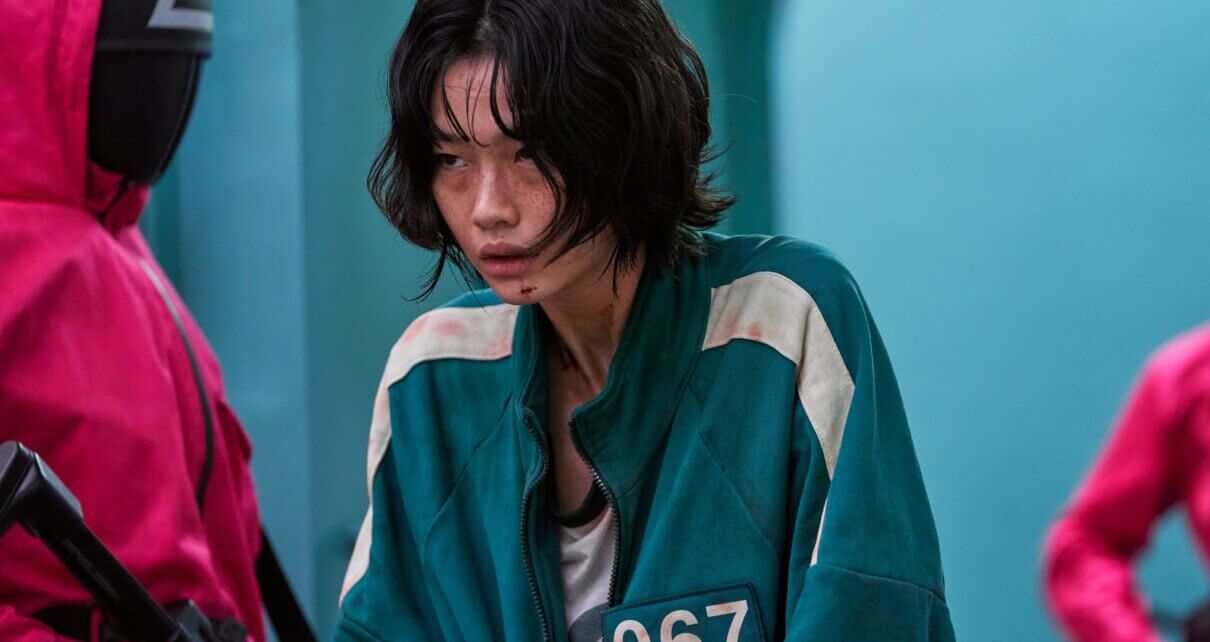Do you like games? Do you like to win money? Would you play a game if it meant you would win money? What if the cost of losing was your life?
These are the questions being asked by a wide variety of fans as they binge watch Netflix’s newest hit Squid Game, a South Korean survival drama released worldwide on Sept. 17, 2021.
After just being out for nine days, Netflix co-CEO Ted Sarandos said during his talk at CodeCon last month that Squid Game is set to be their biggest “non-English-language show in the world.” Even though it is originally filmed in Korean, the network offers the show dubbed in 34 languages and subtitles in 37. Since the series’ release, Flix Patrol—a website that tracks streaming statistics of watchers around the world—reported that Squid Game is ranked No. 1 in dozens of countries; not just in South Korea but also in the UK and the United States as well.
Taking its name from the classic Korean playground game known as “Squid,” the show follows the struggles of Seong Gi-hun, a chauffeur with a gambling addiction who lives with his elderly mother and is having trouble financially supporting his daughter, who lives with her mother and stepfather.
Needing to pay back some loan sharks an extraordinary amount of money, his financial problems turn around real quick when a stranger asks to play a game.
After winning a game of milk caps and receiving one hundred thousand Won, the stranger offers Gi-hun a chance to win more than what he had just received, and leaves him with a card with a number to call should he accept. Knowing this is his chance to make things right with his family, he accepts and calls the number, which leads him to be taken away, unconscious, by masked men and to be woken up in a room with a large group of people, all wearing green tracksuits with numbers ironed onto them. A total of 456 players are led to play the first of six games, and in the end, the winner will take home a cash prize of 45.6 billion Won—which is roughly equal to 38.7 million US dollars.
The first game is simple—Red Light, Green Light—but not the kind you’re thinking of; moving even in the slightest is grounds for “elimination.” Packed with intense scenes involving high graphics of violence, plus a stage design that makes you think you’re in an M.C. Escher painting, Squid Game offers a unique viewing experience, with a simple storyline that allows the viewers to get in touch with the characters, who are putting everything on the line to win the grand prize.
Along with Gi-hun, other players include: former gangster Jang Deok-Su; Pakistani immigrant Abdul Ali; an elder with a brain tumor known only as “Player 001;” Gi-hun’s old friend Sang-woo; and Kang Sae-byeok, played by Jung Ho-yeon—called “Korea’s next top model” by Vogue—in her acting debut.
The main influence this show has had on the public is really its insanely prevalent social media presence. Lately, on Twitter and TikTok, people have been posting videos and memes on moments in the show, as well as recreating certain games that were played in the show itself.
Shivani Ghatak, a sophomore anthropology student, said, “If you go on TikTok for about an hour, you will understand the games they play without having to watch the show.”
As viewers progress through the season, they see the development of the characters and how they represent both the good and the bad in human behavior; this is a good example of why this show is more watchable for an older, more mature audience and not something one would show their kid on their birthday.
However, based on current events it may be difficult for the hit show to stay on the air at all, as it seems that the producers of the show used stolen information in the making of the show.
A South Korean phone number is printed on the cards; players in the show use this card to call in to the producers and be taken to the location of the games. However, recently news has broken that the telephone number was actually legit—and it belonged to business man Gil-Young Kim, who lives and works in Seongju, North Gyeongsang Province, South Korea.
Since the release of Squid Game, Gil-Young has received thousands of texts and phone calls, each one calling in to inquire about the fictitious game that is on everyone’s mind, making it difficult for his place of business as well as his own peace of mind. Netflix may be in for a lawsuit because of the negligence in this matter, for the case has sparked both domestic and foreign conversations analyzing the situation and trying to help cease the trouble that Gil-Young has endured.
What started out as yet another shot for an original show on one of the many active streaming services has become the most watched and heavily-debated program to hit the media this year.
Catching the eyes of viewers around the world, the elements of Squid Game’s story are a true testament to bringing others together and uniting many over one topic. I can say with utmost certainty that this is a must-see show, but it seems like so many people have already figured that out.




